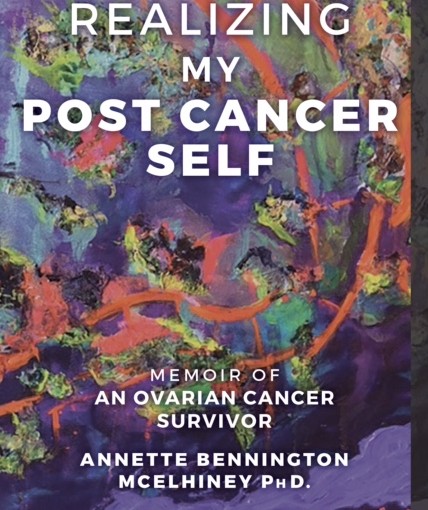By: Annette McElhiney
When I was growing up in the 1950s, none of my immediate family, but many neighbors, distant relatives and acquaintances had cancer. Somehow, a cancer diagnosis always elicited silence, sadness, grief, and dread. Then, some people even thought cancer was contagious and could be spread from person to person. Consequently, while having heart disease was tragic, it never carried the stigma that a cancer diagnosis carried! To eradicate that stigma, I think we need to share our cancer stories with other survivors.
In 2008, at 67, I was diagnosed with stage IIIC high grade, serous ovarian cancer, was incompletely debulked (hysterectomy, ophrectomy and removal of surrounding tissue) and was given a 25% – 35% chance of living five years. I knew there was no cure and I was terrified.
As usual, the time between diagnosis and surgery was short. But as a former nurse, I had researched ovarian cancer and knew that the gold standard chemo treatment was carboplaten and taxol. However, listening to the advice of my younger son who sold oncology drugs and another gynecologist/oncologist, I asked to follow the protocol for a new treatment GOG 218 (a clinical trial using Avastin in addition to the gold standard treatment and then an additional year of Avastin as maintenance).
I don’t remember much about my surgery or the period immediately after except activating the pain pump as frequently as possible so I didn’t have to think. If I thought about it, I began worrying about how long I might or might not live. When I went home at the end of 5 days, my sons and husband moved a bed downstairs to my study. I got up and dressed everyday, but stayed close to home. If I couldn’t sleep late at night, I’d get out of bed and send an email to my friend who had lung cancer. She was a night owl and always available to listen because she understood the physical and emotional anguish of a cancer diagnosis.
In the meantime, news traveled quickly and I began receiving email messages from friends back in Missouri where I grew up. I’d decided that I’d always been truthful and would try to be now about cancer and its affects. So I compiled a long email list and updated the recipients every week or so. Not all of them continued to correspond, but many did. Every note or letter made me feel better because they gave me the courage to fight. Also, I hoped in return, that the account of my diagnosis, treatment, and recovery provoked others to avoid my fate or gave them the courage to face such a diagnosis. But my surprise when I started chemo a month later, that many women didn’t feel comfortable discussing their cancer diagnosis and treatment.
After chemo, about two years later, one woman who previously had breast cancer told me, “You need to get over your cancer, stop thinking like a victim, and get on with your life.” Knowing that ovarian cancer is 1 in 73 women and breast cancer is 1 in 8 — the death rate for ovarian cancer is much higher than it is for breast cancer. I did not see myself as a victim, but as a warrior for myself and a champion of all women who have ovarian cancer. I still feel that way!
In most cancers, if you don’t recur within 5 years, you are considered cured! Many of us know that is not necessarily true for ovarian cancer patients. We can be in remission for 19 years and still recur at year 20. However, I did breathe a sigh of relief when I passed the 5 year mark and once again after spending 8 years in remission. I’ve recently faced a suspicious scan and know cancer can return in a second. But I have increased hope that in time science will have progressed enough with precision medicine and immunotherapy to buy me more years of life.
Twenty years ago, few ovarian cancer advocates existed because most women died in the first two years. Today, I will never get over it because there are just too few ovarian cancer survivors who remain well enough to advocate for those with the disease. Each times a sister survivor dies, she takes a piece of me with her. Therefore, I’m fighting for all women — both alive, struggling, and those who have passed.
Consequently, I’ve tried in Realizing My Post Cancer Self: A Memoir of An Ovarian Cancer Survivor to explain how ovarian cancer has both changed my identity and made me more of the woman I always was.
My purpose in writing this book is to reveal to family, friends, sister survivors, and others my thoughts and feelings throughout this journey, to give myself and others knowledge, hope, and share what strategies have helped me cope with my diagnosis.
For those of you out there who are alive and healthy, I hope you will join me in writing and sharing your stories. By doing so, we are educating, supporting and advocating for other ovarian cancer sister survivors. We are exceptionally lucky to still be alive and I hope as a result of our work, more women are each year.
All royalties from my artwork and books are donated to The Clearity Foundation, Cedars Sinai Ovarian Cancer Research Program, and COCA.


